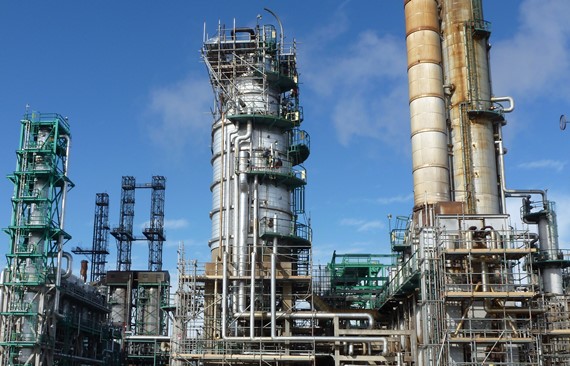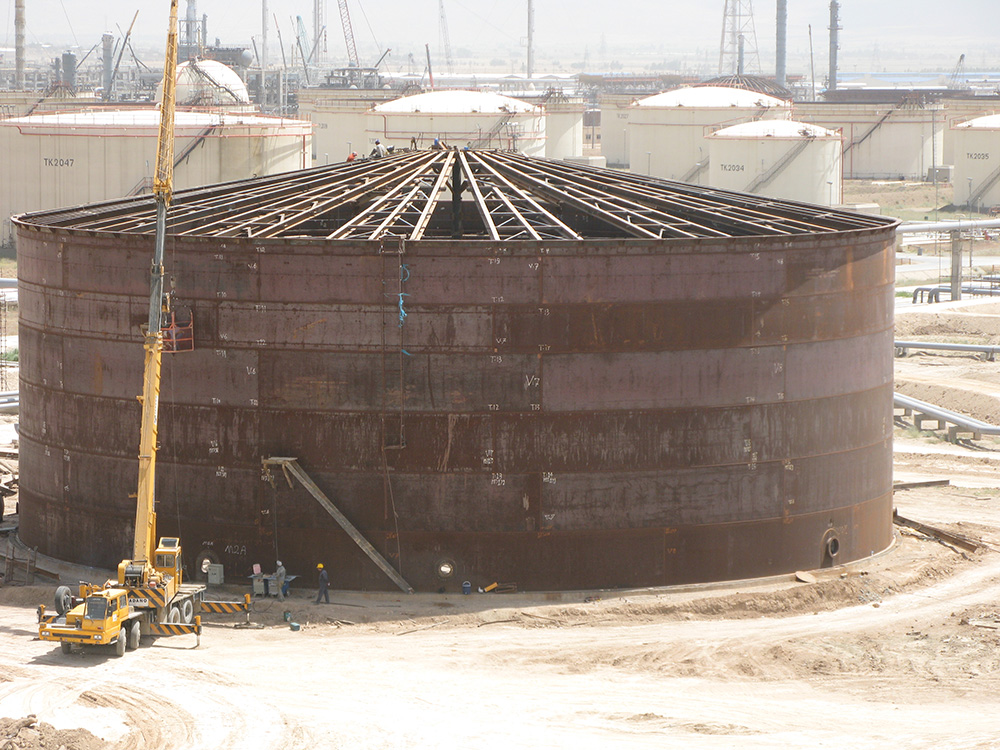A vacuum distillation tower, also known as a vacuum distillation column, is a crucial apparatus used in various industrial processes to separate and purify chemical compounds. This process is especially beneficial in industries such as oil and gas, petrochemicals, pharmaceuticals, and food processing. In this article, we will explore the principles of operation of a vacuum distillation tower and its applications in different industries.
Definition and Principles of Operation
Vacuum distillation is a process where liquids are boiled and separated at a pressure lower than atmospheric pressure. Reducing the pressure in the distillation column lowers the boiling point of the substances, allowing for the separation of high-boiling-point materials without the need for extremely high temperatures. This method is particularly suitable for heat-sensitive materials.

Also read: Design and operation of vacuum towers
Applications of Vacuum Distillation Towers in Industry
Vacuum distillation towers have diverse and vital applications in various industries due to their unique capabilities in separation and purification under low pressure. Here, we will discuss the primary applications of vacuum tower under pressure in the oil and gas industry, petrochemical industry, pharmaceutical industry, and food industry.
Oil and Gas Industry
In the oil and gas industry, vacuum distillation towers are used to separate heavy components of crude oil and produce various products. These towers allow refineries to isolate heavy materials such as heavy oils, asphalt, and waxes. This process is essential for producing heavy fuels. For example, lubricating oils used in industrial engines and vehicles are produced through vacuum distillation. This method allows high-boiling-point components to be separated without requiring very high temperatures, preserving product quality and reducing energy consumption.
Petrochemical Industry
In the petrochemical industry, vacuum distillation towers are widely used to produce high-purity chemicals. Chemicals such as alcohols, acids, and organic solvents require purification, which vacuum distillation can effectively achieve. Additionally, vacuum distillation towers are used in the production of polymers and monomers. Petrochemical processes need precise separation of materials to produce high-quality and pure final products, and vacuum distillation towers meet this need.
Pharmaceutical Industry
Vacuum distillation towers in the pharmaceutical industry are used for purifying pharmaceutical compounds and producing high-quality raw materials. This industry requires precise and efficient purification processes to produce pharmaceutical compounds of the highest possible quality. Many pharmaceutical compounds are heat-sensitive and decompose at high temperatures. Vacuum distillation allows pharmaceutical manufacturers to distill and purify these compounds at lower temperatures, preserving their structure and efficacy.
Food Industry
In the food industry, vacuum distillation towers are used to produce natural extracts and essences from plants and fruits. This process helps preserve the quality, aroma, and flavor of the products. Additionally, vacuum distillation is used in the production of edible oils. This method helps produce high-quality edible oils and remove impurities present in them. Using vacuum distillation towers in the food industry not only helps preserve the organoleptic properties of the products but also prevents the degradation of heat-sensitive materials.
Advantages of Vacuum Distillation Towers
- Lower Distillation Temperatures: Lowering the pressure in the vacuum distillation tower reduces the boiling points of the substances, allowing the separation of high-boiling-point materials at lower temperatures. This is particularly important for heat-sensitive materials.
- Improved Product Quality: Vacuum distillation helps produce purer and higher-quality products by allowing better and more precise separation of components.
- Energy Savings: Lower distillation temperatures require less energy for heating the materials, leading to reduced energy costs.
- Protection of Heat-Sensitive Materials: This process prevents the degradation of heat-sensitive materials, preserving their chemical and physical properties.

Conclusion
Vacuum distillation towers play a crucial role in various industries due to their unique ability to separate and purify materials under low pressure. From separating and purifying components in the oil and gas industry to producing high-purity chemicals in the petrochemical industry, manufacturing pharmaceutical compounds, and preserving the quality of food products, these towers enhance the efficiency and quality of industrial processes. By using vacuum distillation towers, industries can increase process efficiency, produce higher-quality products, and save on energy costs while protecting heat-sensitive materials.
Installation and Operation Guide for Vacuum Distillation Tower
Choosing the Right Location
- Ventilation: The installation site should have proper ventilation to ensure the safe operation of the vacuum distillation tower.
- Accessibility: Ensure easy access for maintenance and periodic inspections to keep the system running efficiently and safely.
Design and Construction
- Industry Standards: The vacuum distillation tower must be designed and constructed according to industry standards to ensure reliability and safety.
- Material Selection: Use corrosion-resistant and heat-resistant materials to construct the tower to withstand the operating conditions.
Installing Auxiliary Equipment
- Vacuum Pumps: Install vacuum pumps properly to achieve the desired pressure levels for effective distillation.
- Heat Exchangers: Set up heat exchangers to manage the temperature of the materials being processed.
- Control Systems: Implement temperature and pressure control systems accurately to maintain optimal operating conditions.
Testing and Commissioning
- Thorough Testing: Conduct rigorous tests on the vacuum distillation tower post-installation to ensure all components function correctly.
- Operational Checks: Verify the operation of the control systems, vacuum pumps, and other auxiliary equipment to ensure the entire system is working harmoniously.
Benefits of Vacuum Distillation in Industry
Vacuum distillation is a crucial process in various industries due to its multiple advantages:
- Lower Boiling Points: The process reduces the boiling points of materials, enabling the separation of substances at lower temperatures.
- Enhanced Product Quality: Produces purer and higher-quality products by allowing more precise separation.
- Energy Efficiency: Lower temperatures mean less energy is required, leading to cost savings.
- Protection of Heat-Sensitive Materials: Prevents degradation of materials sensitive to high temperatures, maintaining their chemical integrity.
Importance in Various Industries
- Oil and Gas:Used to separate heavy fractions of crude oil and produce high-quality lubricants and heavy fuels.
- Petrochemicals: Produces high-purity chemicals and polymers with precise separation needs.
- Pharmaceuticals: Essential for purifying sensitive compounds and producing high-quality pharmaceuticals.
- Food Industry: Extracts natural essences and produces high-quality edible oils without degrading their properties.
Ensuring Efficiency and Safety
Adhering to proper installation and operational practices ensures the vacuum distillation tower operates efficiently and safely:
- Regular Maintenance: Conduct regular inspections and maintenance to prevent breakdowns and ensure longevity.
- Operator Training: Train operators thoroughly on the system’s functionality and safety procedures.
- Compliance with Standards: Follow all relevant industry standards and guidelines for safe and effective operation.
By following these guidelines, industries can harness the full potential of vacuum distillation towers, ensuring high efficiency, product quality, and safety in their processes.







